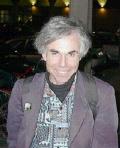
 |
|
|
Fred Collopy Ashok Goel Sungwook Yoon Andrew Warr Mary Lou Maher Bill Mitchell Gerhard Fischer Larry Leifer Roger Dannenberg Ben Shneiderman Roger Malina Chris Bregler John Gero Mark d'Inverno Thomas Hewett Christopher Jaynes Ken Perlin Dana Plautz Rob Saunders Scott Snibbe Kumiyo Nakakoji Michael Leyton Pamela Jennings Mark Gross Steven Smith Ruzena Bajcsy Rob Woodbury Terry Winograd Hal Eden Tristan Jehan Holger Dick Umer Farooq Alex Ivanov Michael Prilla Klara Nahrstedt Dan Ventura Tobias Hollerer Alan Sondheim Sandy Baldwin Wassim Jabi Lee Spector Jon Schull Eric Nichols Douglas Hofstadter Luz-Maria Jimenez Titus Noel Daryl Hepting H. Quynh Dinh Chris Vigorito Mitra Debasis Janet Burge Matthew Clark Lee Boot Brad Myers Sheila Tejada Ellen Yi-Luen Do Aditya Johri Young Joon Kim |
 Douglas R. Hofstadter Center for Research on Concepts & Cognition Indiana University, Bloomington http://www.cogsci.indiana.edu/ Douglas R. Hofstadter is College of Arts & Sciences Distinguished Professor of Cognitive Science and Computer Science at Indiana University Bloomington where he also directs the Center for Research on Concepts & Cognition. His Pulitzer Prize-winning book "Gödel, Escher, Bach: an Eternal Golden Braid" (1979) has had wide impact on people in many disciplines, ranging from philosophy to mathematics to artificial intelligence to music, and beyond. Hofstadter's long-standing interest in classical music resulted in the creation of visual forms of fugues and canons ("Whirly Art"), and in a number of compositions for piano. Hofstadter's writings and research seek to answer several interrelated questions: (1) how can physical activity give rise to a conscious self? (2) how does the human mind perceive unfamiliar situations and make analogies between situations? (3) how does the human mind create new ideas? To explore these abstract issues in a concrete manner, he has designed and implemented, in collaboration with FARG (the Fluid Analogies Research Group, consisting of himself and his doctoral students), computer models of high-level perception and analogical thought in carefully honed microdomains. Last modified 20 December 2007 at 5:38 pm by epnichols |